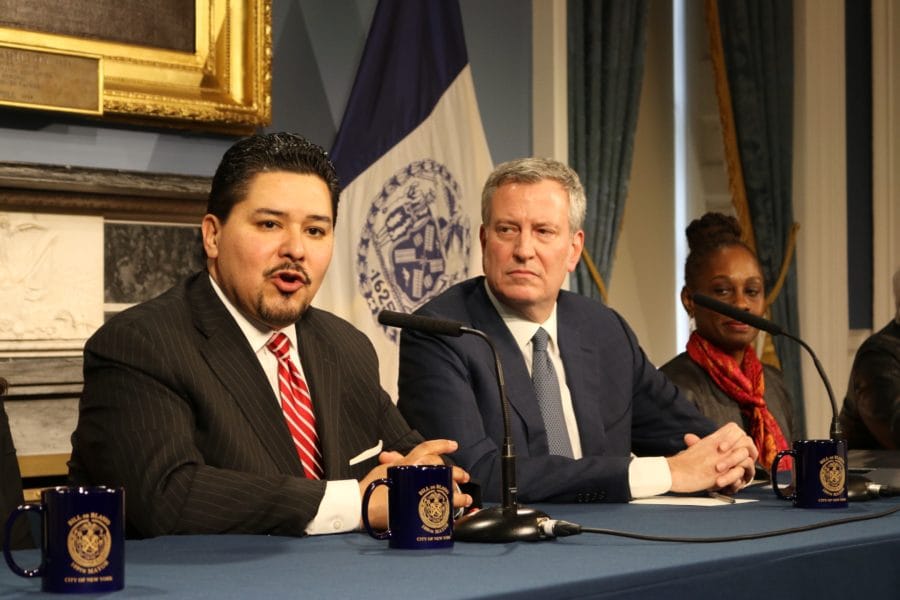New York City lawmakers press Richard Carranza on paid parental leave, counselors, and school accessibility


Richard Carranza faced his first round of questions from city lawmakers Tuesday since taking the helm of the nation’s largest school system — fielding concerns about the education department’s spending priorities contained within its mammoth $25.5 billion operating budget.
Carranza — who is on the same ideological page as the city council’s education leaders — faced a mostly warm reception and earned praise for jumping into the conversation about school segregation, something his predecessor avoided talking about directly and which councilman Danny Dromm called “a real breath of fresh air.”
But council members also pressed the new schools chief on some of the mayor’s spending priorities during the nearly four-hour hearing, including whether there is funding to make sure all schools have counselors, how to ensure more schools are accessible to students with physical disabilities, and whether the department will guarantee teachers paid parental leave in the upcoming teachers contract. (Carranza also announced a $24 million program to boost the city’s health education offerings, part of an effort to get in compliance with city and state regulations.)
Here are three topics that Carranza was questioned about:
Funding to ensure all schools have counselors
Mark Treyger, chairman of city council’s education committee, repeatedly asked Carranza about increasing funding for social workers and guidance counselors: 41 schools would be left without either in the current budget.
Given that the mayor’s budget boosts education spending by nearly $200 million, Treyger said, “$5.2 million to ensure every school has at least one full-time social worker or guidance counselor seems like an obvious choice to me. Why wasn’t this added to the budget?”
The schools chief did not rule out the possibility that funding would be added, but he seemed to push back against the idea that all schools must have either a guidance counselor or social worker. Decisions about whether to add staff are context-specific, Carranza said, adding that “there is local control” and school-level administrators can make hiring decisions.
Paid parental leave
After two Brooklyn high school teachers started a petition calling on the city’s teachers union to negotiate a parental leave policy, the issue has gained traction among local lawmakers — and even the union’s top brass. (Educators who want paid time off to care for their children must currently use sick days.)
Asked about creating a new policy, Carranza signaled the city would adopt one through the negotiating process with the union, whose contract expires this fall — though officials could not say how much it would cost or how the policy would work.
“Obviously we’re not going to negotiate in public,” Carranza said. But, he added, “I will be very supportive of anything that helps [teachers].”
School Access
Multiple city council members pressed Carranza on two very different access problems: Whether the city is spending enough money to update school buildings, most of which are not fully accessible to students with physical disabilities — and whether the city’s elite specialized high schools are too closed off from students of color.
On building accessibility, multiple advocacy groups argue the $100 million set aside in the city’s five-year capital plan to make buildings more accessible should be increased by $125 million. “I have no fully accessible schools in my district,” Treyger said. “This is part of the segregation conversation as well.”
Carranza also faced questions about specialized high schools, which have made virtually no progress enrolling a more representative share of black and Hispanic students in recent years. Carranza suggested that he has seen competitive schools elsewhere use multiple measures to make admissions officers at competitive public schools and “it never diluted the talent pool.”
That would mark a sharp departure from the current system, which awards admission on the basis of a single test. (Some experts say the city has the legal authority to change that requirement at five of the eight specialized high schools, though Mayor de Blasio has disagreed.)
“I want to make sure we’re providing opportunities for the widest number of students,” Carranza said. “All schools should be accessible to all students of the City of New York.”
Chalkbeat is a nonprofit news site covering educational change in public schools.




